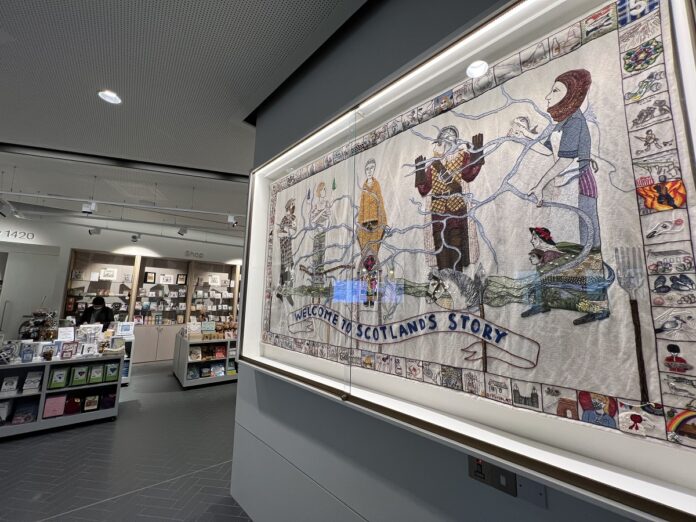“The Great Tapestry of Scotland has finally found its home here,” beams John Baxter, Operations Manager at the impressive new tapestry visitor centre in Galashiels. A place that has been purpose-built to house this modern day wonder. “It’s a piece of living history, an art work for the nation, crafted by the nation.”
An artwork for the nation
There is no way to overstate the effort involved in, and the importance of, what is one of the world’s largest community arts projects. It was hand-stitched by an army of 1,000 people from across the nation of Scotland. It is made up of 160 linen panels and around 300 miles of wool. It really is an artwork for the nation by the nation. It was designed by Andrew Crummy – who worked on the ideas of Scottish author Alexander McCall Smith and historian Alistair Moffat – as a tapestry to tell Scotland’s story.
A purpose-built oasis
Arriving in Galashiels aboard the Borders Railway from Edinburgh – another sign of positive rebirth in the Scottish Borders – I’m just a five minute stroll across the river to the Great Tapestry of Scotland. I follow the line on the ground that weaves its way right to the building. And what a building. This purpose-built oasis casts an unmistakable presence in the heart of Gala: it’s unashamedly modern, but its materials and design don’t jar with its surrounds, becoming part of the town rather than a building that solely dominates it.
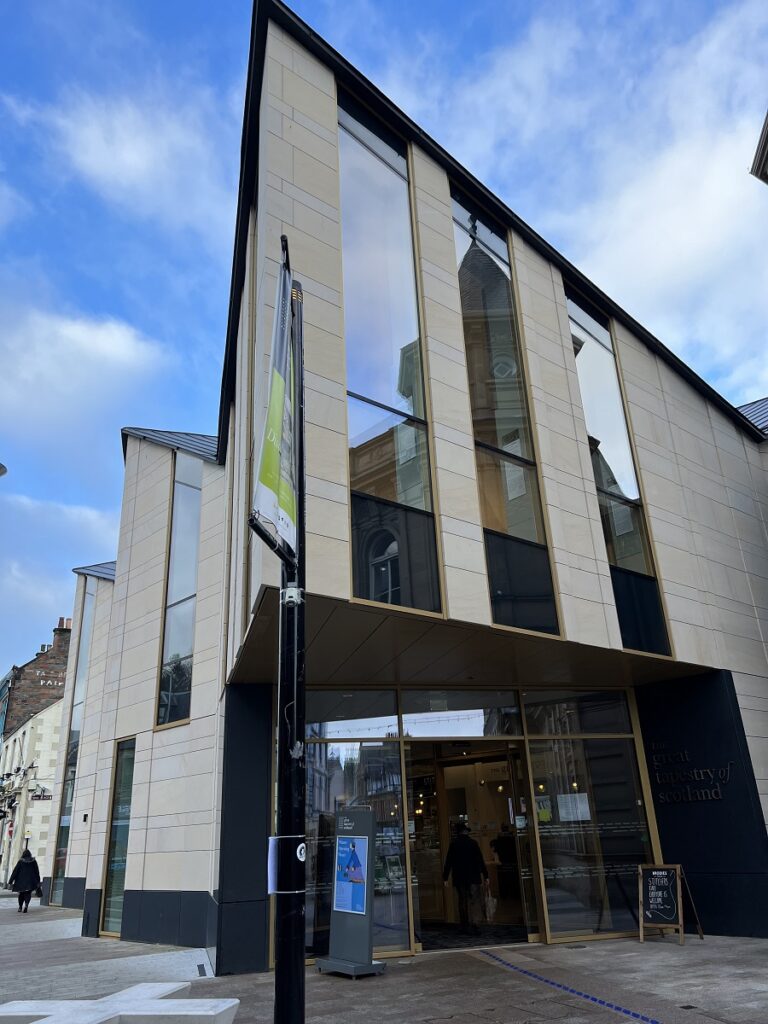
Army of ‘stitchers’
I delve inside to a warm welcome from the reception staff and from John Baxter, who guides me to a seat in their bright ground floor café. We’re not alone as it’s busy with people of all ages enjoying the fresh sandwiches made using local baker Dalgetty’s bread. The coffee is spot on too. It’s great to see so many locals in the café – this is no aloof cultural edifice set apart from the community.
That sense of community, of ties that bind us all, grows as visitor officer Susie Finlayson leads me upstairs. She explains how she was roped in to help as one of the army of ‘stitchers’ who worked on this masterpiece: “I started from scratch and really got into it. So did my mum who started helping out on it too. We’re really proud of our tapestry, as is everyone involved.” And so they should be and of this complex, which also has an imaginatively curated gift shop, workshop space and a further gallery for temporary exhibitions.
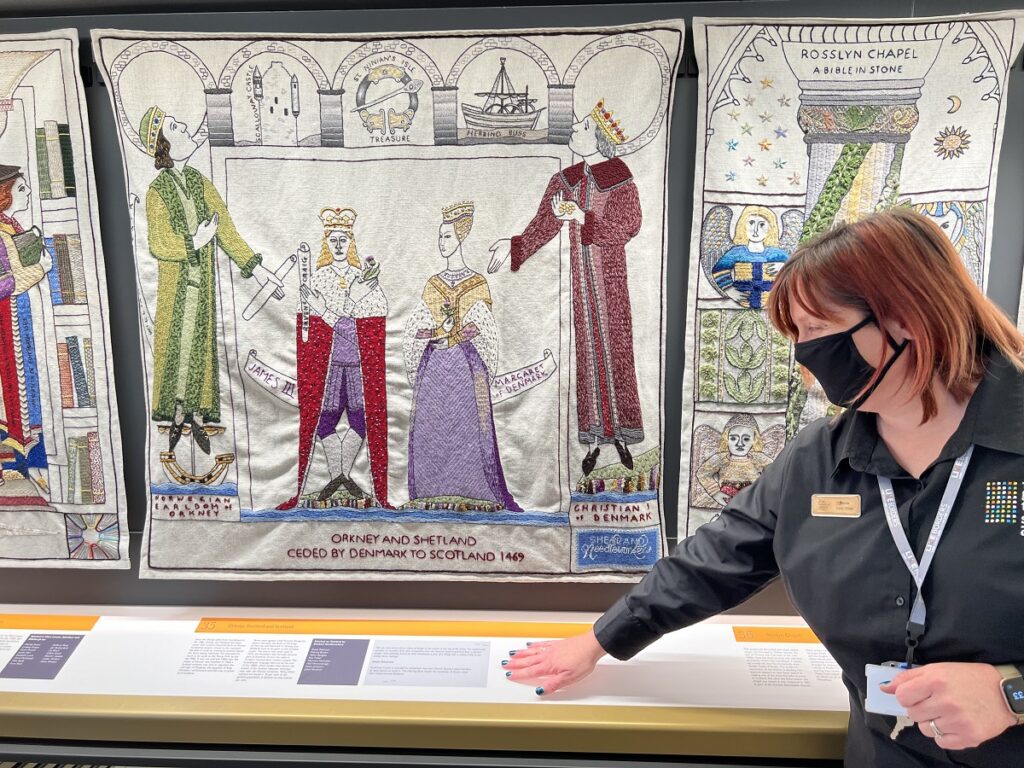
Jaw-dropping exhibition space
The main space upstairs is jaw-dropping. I’ve only ever seen the Great Tapestry of Scotland on show before in the constricting confines of Stirling Castle. It’s hard to think of any space in Scotland more suited to displaying the tapestries, with a flood of natural light bathing in through the vast windows, reflecting off the angled, high ceilings. Scotland’s Bayeux Tapestry (at 143m it’s actually over twice the length of the Bayeux upstart) has truly found its home.
Once I take in the drama of the building itself, I move on to the tapestries, which are laid out with plenty of space, so they are not distracting from each other. I only have an hour to skip around for a greatest hits as it were with Susie, but you could easily spend a day here trying to take in the myriad scenes, each with its own intricacies. It’s easy to see why people buy an annual pass and if you live locally – or plan on heading to the Borders again – I thoroughly suggested you snare one.
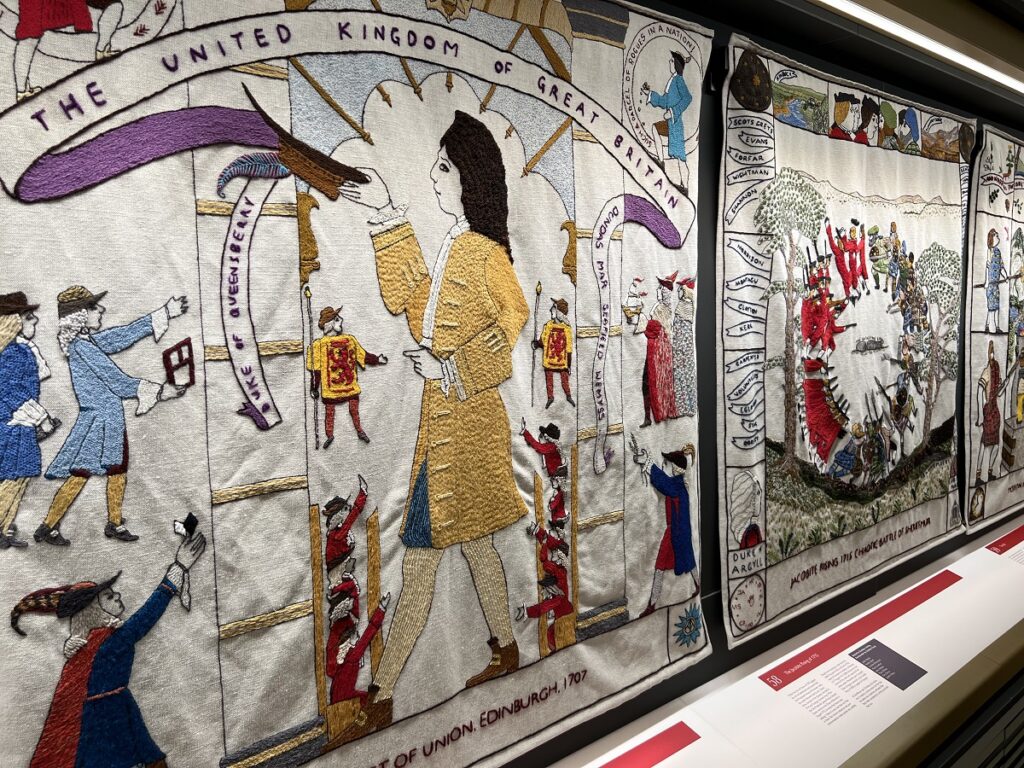
Story of Scotland in intricate detail
The tapestries tell Scotland’s story in ridiculous detail from its geological origins, through to the opening of the Scottish Parliament in 1999. And a little beyond. They are a celebration of Scotland’s history, but not just that – the panels also dive deep into social history. They mark how people’s lives have changed over the centuries, and not just those of our kings and queens. They are as much about the folks in a Glaswegian steamie as they are about oor Bonnie Prince.
I love that you can appreciate them on so many levels. My daughters would appreciate the vivid colours, no two panels the same, and the patterns stitched into them. There are personal touches too – Susie confides in me that she sneaked a wee helicopter into one panel on Fair Isle to mark a crash that her everyone, including here husband, survived. Touchingly she tells me of a couple who worked on the tapestry. After the husband died, the wife came here to find solace in their joint work.
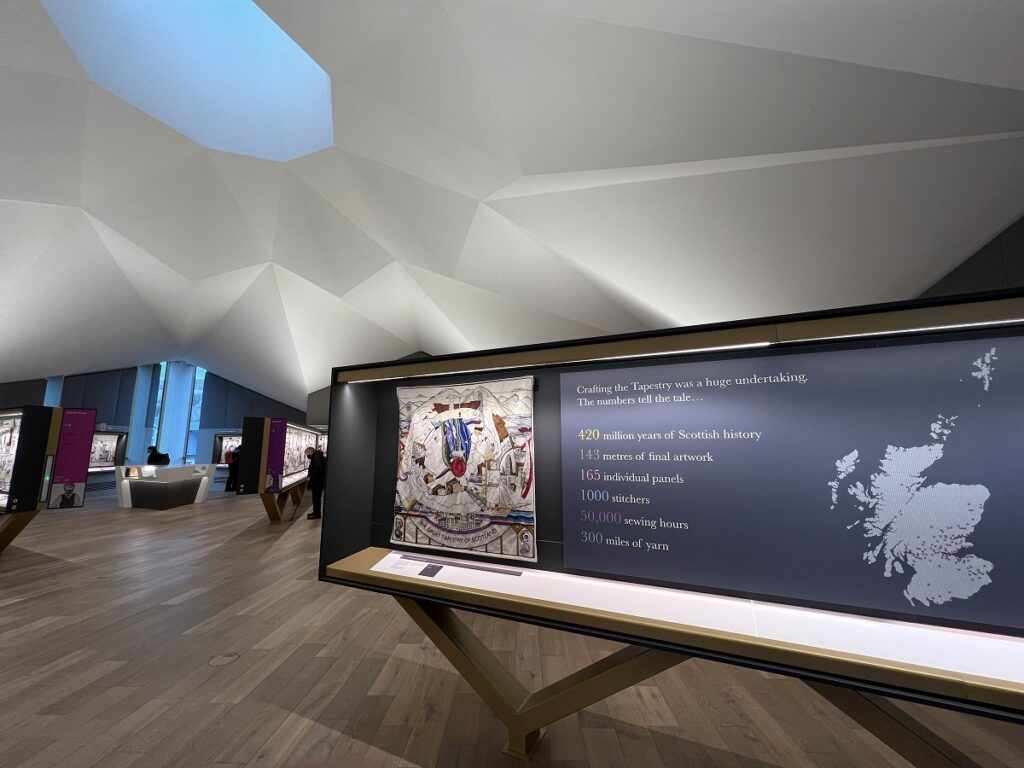
Over 400 million years of history
It’s easy to find your way around the collection as its 160 panels are arranged in chronological order. Zone One kicks off way back in the Ice Age and then the panels sweep on through another quintet of zones that cover 400 million years of the story of Scotland. If you’re in a hurry look out for the panels marked by Alistair Moffat himself with a Saltire symbol as they have been chosen to tell a potted history of the nation.
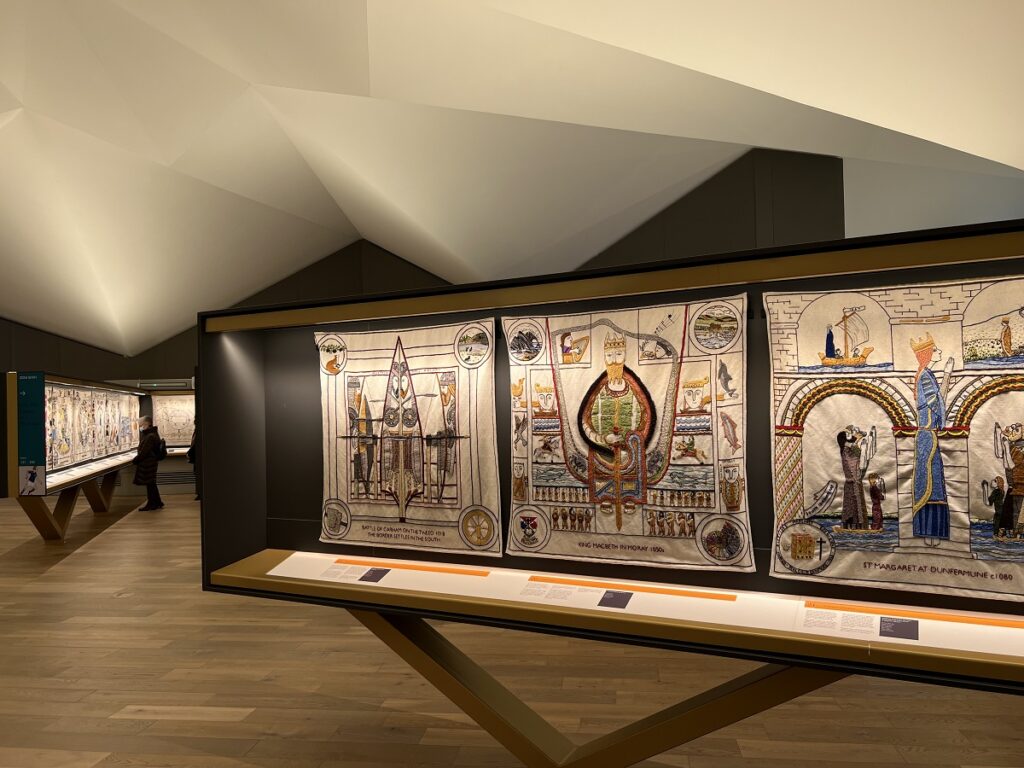
A truly unmissable attraction
Everyone has their favourites. I don’t see a duff ones at all. I love the big hitters like Bannockburn and the Jacobite ’45 Rising, but also I’m snared by things I know less about, like The Scottish Trades Union Congress Forms. Then there is the very local Borders Tweed panel that depicts the story of this famous fabric, which hails from just down the road in Hawick.
Whether you want to take a deep dive into the history of the nation of Scotland, or maybe more the aspects of societal development, or just want to appreciate artistry of the designers, the stitchers and the sheer vision involved, the Great Tapestry of Scotland is an unmissable attraction. I’ve already booked to go back with my wife and kids!
For more information on the Great Tapestry of Scotland see www.greattapestryofscotland.com
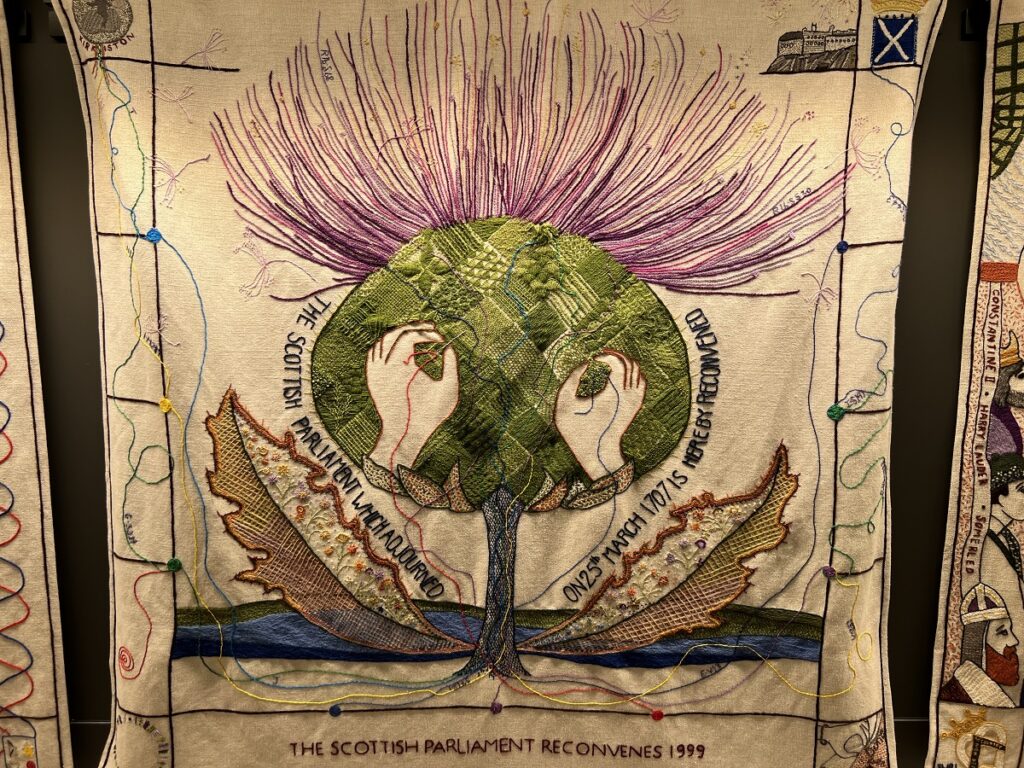
This post comes in association with The Great Tapestry of Scotland. Note all views expressed are our own and are independent.
